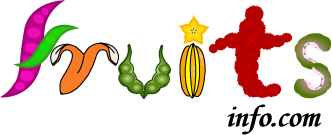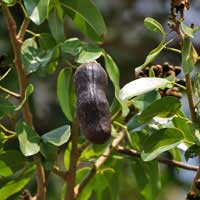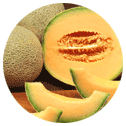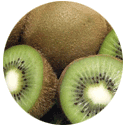 Full List of Fruits
Full List of Fruits  Jatoba Fruit
Jatoba FruitJatoba Fruit
Scientific name - Hymenaea courbaril
Jatoba is endemic to the Caribbean, Central, and South America. The tree’s wood is used for manufacturing quality furniture and decorative items. Jatoba is otherwise popularly known as Brazilian cherry or South American cherry. The tree actually does not bear a cherry but its legume belongs to Fabaceae family.
The edible pulp which appears like a soluble fiber is present inside the tough shell that is capable of getting readily dissolved in water/milk. On consuming raw fruit it may tend to stick in the mouth and some people add sugar to get more enhanced sweet flavor. The fruit contains high source of starch and proteins.
The jatoba tree is a large, deciduous tree, growing up to 30 meters tall. It has an open canopy and produces large, fragrant flowers that bloom in the spring. The tree is long-lived and can reach up to 300 years old.
The jatoba tree produces fruit from November to April. The fruit is picked by hand when it is ripe and usually eaten fresh or used in the production of jatoba syrup. Jatoba syrup is a popular ingredient in many Brazilian desserts and drinks.
![]() Nutritional Value of Jatoba Fruit
Nutritional Value of Jatoba Fruit
| Nutritions | Value |
| Calories | 309 |
| H2O | 14.6 g |
| Protein | 5.9 g |
| Fat | 2.2 g |
| Total Carbohydrate | 75.3 g |
| Fiber | 13.4 g |
| Ash | 2.0 g |
| Ca | 28 mg |
| P | 143 mg |
| Fe | 3.2 mg |
| Thiamine | 0.23 mg |
| Riboflavin | 0.14 mg |
| Niacin | 4.1 mg |
| Ascorbic acid | 11 mg |
The fruit is majorly used for treating mouth ulcers and diabetes. It also helps in aiding respiratory ailments such as asthma, laryngitis, and bronchitis. Jatoba is considered as a medicine meant for healing hemorrhages, bursitis, bladder infections, arthritis, prostatitis, yeast and fungal infections.
In traditional herbal medicine, jatoba fruit is used to treat a variety of ailments, including digestive issues, respiratory illnesses, and skin conditions. The fruit is believed to have antifungal and anti-inflammatory properties, which make it useful for treating skin conditions such as eczema and psoriasis. It is also used to treat digestive problems, such as indigestion, diarrhea, and constipation.
Jatoba fruit is also thought to have expectorant properties, which may help to clear congestion and relieve respiratory illnesses. It is often used in teas, tinctures, and syrups to help reduce coughing and loosen mucus. The fruit is also believed to be beneficial for the immune system, as it is high in antioxidants and may help to protect the body from disease.
Jatoba fruit is also used as a tonic to provide a boost of energy and vitality. It is believed to help improve mental clarity and focus, as well as reduce stress and anxiety. The fruit may also be beneficial for cardiovascular health, as it is high in antioxidants and may help to reduce cholesterol levels.
In addition to its medicinal uses, jatoba fruit can be used to make jams, jellies, and preserves. It can also be added to smoothies and other drinks for an extra boost of flavor and nutrition.
The tree grows well under a full sun or a partial shade in the moist soil and humid atmosphere. The species has to be planted in frost free locations. Jatoba fruit is a unique and exotic fruit native to the tropical rainforest regions of Central and South America. Also known as the Brazilian cherry, Jatoba is a small, round to oval-shaped fruit with a bright red-orange hue on the outside and a light yellow-brown color on the inside. It has a sweet, tart flavor and a crunchy texture.


















